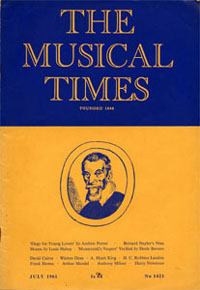
Berlioz and Colin Davis
by
David Cairns
© 1961-2012 David Cairns

 |
Berlioz and Colin Davisby David Cairns © 1961-2012 David Cairns |
 |
Last month—on June 2, 4 and 6 respectively—Colin Davis conducted three large-scale Berlioz works: The Childhood of Christ, Romeo and Juliet and the Funeral and Triumphal Symphony. David Cairns, who was at all three performances (and a member of the orchestra at the second), comments on them:
That the performance of three major works of Berlioz within a week by the same conductor should excite astonishment is a melancholy reflection of the state of opinion on this matter. But I do not think that this kind of feat will be hailed as bizarre or extraordinary for very much longer. It is true that champions of Berlioz always suffer from the occupational belief that their aim (which is simply the acceptance of Berlioz, without facetiousness, as a reputable master like any other) is on the point of being achieved. But this time Berlioz really seems to be getting somewhere. Taste, general and critical, is moving steadily towards him. The London public now thinks nothing of filling a large auditorium not only for the Fantastic Symphony but for Romeo and Juliet, The Trojans and the Requiem. The pedants and the detractors (like the fanatics) are a dying race whose antics no longer irritate or deceive but only amuse. Soon—say by 1969, the centenary of the composer’s death—Colin Davis or any other conductor will be able to give three Berlioz works in a week without its causing a sensation.
If this proves true, Mr Davis will have had a lot to do with it. His understanding of Berlioz’s mind and idiom is already profound. I cannot speak of his performance of the Funeral and Triumphal Symphony with the massed bands of the Brigade of Guards, since it is a work I know very superficially. My feeling was that the monumental first movement would have benefited from a more dragging pulse, and that the trombone solo in the second movement should have stood out more clearly from the rest of the band. But the sweep and vigour of the performance as a whole was not in dispute; and in any case exact criticism is difficult when the acoustics are as imperfect as in the Regent’s Park Open-air Theatre, much of the sound disappearing through the surrounding trees and shrubberies for lack of a sounding board; we could have done with the full complement of players specified for the original performance in 1840—207 to the Guards’ 150. None the less a splendid occasion, which the organizers, Martini International Club, should repeat indoors or in some large courtyard.
Mr Davis’s performances of The Childhood of Christ (Bath Festival) and Romeo and Juliet (Cambridge Guildhall, with the Chelsea Opera Group, a repetition of a performance in Oxford Town Hall the previous week) were, I thought, extraordinarily perceptive and complete. Here and there I felt that his concern for spaciousness and beauty of melody led him to miss something characteristic in the music: the Overture to The Flight into Egypt, both at Bath and on the recently issued Oiseau Lyre recording, seemed to me just too leisurely for that note of unease and disquiet which is heard in Munch’s generally less sensitive recording. But for the most part he was admirably faithful to both letter and spirit of the score. The one depends on the other. With a composer whose style is as sui generis as Berlioz’s, the lack of truly idiomatic performances of his works is a continual barrier to their popularity. It is a vicious circle of infrequency, distortion and incomprehension. We wait expectantly for the appearance of some unfamiliar or controversial work, and when it does appear, it comes in such a questionable shape that we are as bewildered as before, expectations are dashed, and critics confidently record another instance of Berliozian eccentricity and miscalculation. Even Monteux’s recent performance of Romeo and Juliet was on the whole too unidiomatic to do more than rough justice to the work, while a performance of The Childhood of Christ in the Festival Hall last winter was a shameful travesty.
Where Mr Davis is such a boon to Berlioz is that in almost every case he starts with the basic tempo that the composer demands, and on this sure foundation builds his splendid conceptions of each work. It is, I know, fashionable to distrust metronome marks, but I am more and more convinced that in Berlioz they are the key to successful interpretation. Occasionally, no matter how you look at it, an indicated tempo will not make sense (the Rakoczy March is one of these— minim 88, surely an impossibly slow speed, which I have never heard attempted; Beecham’s nonpareil prewar recording is c. l00, Toscanini’s much faster). But in nine-tenths of Berlioz the marking means exactly what it says. Tempo, of course, though indispensable, is only the beginning. Beyond that, it was his power to evoke the atmosphere of the music that made Mr Davis’s interpretations so satisfying. Atmosphere is paramount in Berlioz. According to how it is played and sung, a piece like Strophes, the contralto solo in the first part of Romeo and Juliet, can sound either a bald and meaningless succession of notes, or a marvellously rapt expression of the ecstacy of first love.
Acoustics, of course, play their part, and one of the things that helped to make Monteux’s Romeo and Juliet a disappointment (especially after his superb performance of the Fantastic Symphony a few weeks earlier) was the unsuitability of the Festival Hall for this subtly evocative music. The medium-sized hall which is to be built on the South Bank could be an ideal setting for Berlioz’s secular concert works. I think it would find a very willing public for them.
![]()
* We are most grateful to David Cairns for granting us permission to reproduce this article on this page. We have transcribed the text of the article from The Musical Times, July 1961, a copy of which is in our collection. ![]()
![]()
The Hector Berlioz Website was created by Monir Tayeb and Michel Austin on 18 July 1997; this page created on 1 April 2012.
© Monir Tayeb and Michel Austin. All rights reserved.
![]() Back to Berlioz: Pioneers and Champions
Back to Berlioz: Pioneers and Champions
![]() Back to Original Contributions page
Back to Original Contributions page
![]() Back to Home Page
Back to Home Page
![]() Retour à la page Berlioz: Pionniers et Partisans
Retour à la page Berlioz: Pionniers et Partisans
![]() Retour à la page Contributions originales à ce site et autres articles
Retour à la page Contributions originales à ce site et autres articles
![]() Retour à la Page d’accueil
Retour à la Page d’accueil